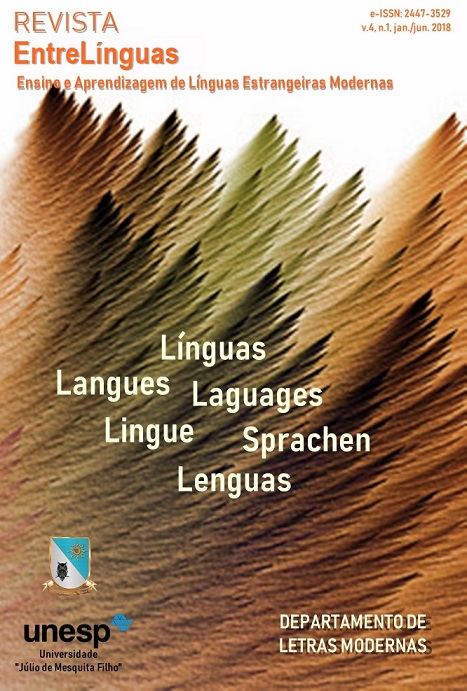We go to ...: webquests as a proposal for cultural mediation in german as a foreign language
DOI:
https://doi.org/10.29051/rel.v4.n1.2018.11177Keywords:
WebQuest, Foreign language, German as a foreign language, Projects, Landeskunde.Abstract
Neuroscientific research has shown that the more senses are involved in the learning process, the greater the chances of information being stored in the brain. In this context, the internet and the new information and communication technologies (ICT) can be ideal means in the activation of several senses and help in the learning process. In recent years, we have seen that ICTs have come to play a relevant role in the teaching of foreign languages, being used by teachers, e.g. for the acquisition and development of teaching material, and for students to learn more about the country, people and target language culture. In this article I demonstrate the use of the internet, more specifically the work with WebQuests, and how I familiarize Brazilian beginner learners from German with the city of Berlin.
Downloads
References
ALTMAYER, C. Von der Landeskunde zur Kulturwissenschaft – Innovation oder Modetrend?. Germanistische Mitteilungen, v. 65, p. 7-21, 2007.
CONSELHO EUROPEU. Quadro Europeu Comum de Referência para as línguas: aprendizagem, ensino e avaliação. Lisboa: Edições ASA, 2001. Disponível em: http://www.dge.mec.pt/sites/default/files/Basico/Documentos/quadro_europeu_comum_referencia.pdf. Acesso em: 25 fev. 2018.
DALLAPIAZZA, R.-M.; JAN, V. E.; SCHÖNHERR, T. Tangram aktuell 1. Kursbuch und Arbeitsbuch, Lektion 7 – 8. Ismaning: Hueber. 2004.
DELIZOICOV, D.; ANGOTTI, J. A.; PERNAMBUCO, M. M. Ensino de Ciências: fundamentos e métodos. São Paulo: Editora Cortez, 2002.
DODGE, B. Building Blocks of a WebQuest. 1996. Disponível em: https://www.internet4classrooms.com/buildingblocks.htm. Acesso em: 25 fev. 2018.
DODGE, B. WebQuests: A technique for Internet-based learning. Distance Educator, v. 1, n. 2, p. 10–13.
DONATH, R. E.; KLEMM, U. Sprachhandlungskompetenzen entwickeln in multimedialen Lern- und Lebenswelten. In: BACH, J.; TIMM, J.-P. (org.): Englischunterricht: grundlagen und methoden einer handlungsorientierten unterrichtspraxis. Stuttgart: A. Francke/UTB, p. 121-149, 2009.
GOUVEA, S. A. S.; MALTEMPI, M. V. Utilização de WebQuest em um Ambiente de Aprendizagem Construcionista. In: IV Conferencia Argentina de Educación Matemática (CAREM), Buenos Aires, Argentina, 07 a 09 de outubro 2004.
MARTÍNEZ FRAILE, C. Landeskundliche Netzangebote für DaF-Lerner. Ein aktives Modell aus methodisch-didaktischer Sicht. Revista Nebrija de Lingüística Aplicad, v. 13, 2013.
MOSER, H. Abenteuer Internet. Lernen mit WebQuests, Zürich: Pestalozzianum, 2000.
PELLIZZARO, I. TI + Neurociência: games são a porta de distribuição para novos conteúdos. 2014. Disponível em: http://convergenciadigital.uol.com.br/cgi/ cgilua.exe/sys/start.htm?infoid=36763&sid=127#.VjEtCiv0-pQ. Acesso em: 25 fev. 2018.
PINHEIRO, T. de F.; ALVES FILHO, J. de A. O projeto temático como atividade de estágio na prática de ensino de física. Manuscrito s/d. Disponível em: http://www.cienciamao.usp.br/dados/snef/_oprojetotematicocomoativ.trabalho.pdf. Acesso em: 25 fev. 2018.
PROJEKT. DSD-Wiki. Disponível em: http://wikis.zum.de/dsd/Projekt#Was_ist ein Projekt.3F. Acesso em: 25 fev. 2018.
STANICH, K.; MEIRELES, S. Processamento cognitivo relacionado à produção em língua estrangeira e aprendizagem de falantes não-nativos de alemão. Pandaemonium germanicum, São Paulo , n. 14, p. 179-205, 2009.
STRASSER, T. Die Moodle-Cyberschool im Fremdsprachenunterricht - Blended Learning als didaktisch-innovativer Ansatz im Italienischunterricht oder pädagogische Eintagsfliege?. Tese (Doutorado). Universität Wien, Viena, 2010.
TAVARES, L. L. Projetos culturais em sala de aula de alemão como língua estrangeira. In: DILL, C. J; DIETRICH, G.; KAUFMANN, G.; ALT, L.; SILVA, R. F.; THEIS, W. (orgs.). Tagungsakten des VI. Brasilianischen Deutschlehrerkongresses und I. Lateinamerikanischen Deutschlehrerkongresses. São Paulo. 2006.
ZEUNER, U. Landeskunde und interkulturelles Lernen. Eine Einführung. Ergänzte Version. 2009. Disponível em: https://tu-dresden.de/gsw/slk/germanistik/daf/ressourcen/dateien/dateien/materialien_zeuner/zeuner_reader_landeskunde.pdf?lang=en. Acesso em: 25 fev. 2018.
Downloads
Published
How to Cite
Issue
Section
License
Os manuscritos aceitos e publicados são de propriedade da Revista EntreLínguas. Os artigos publicados e as referências citadas na Revista EntreLínguas são de inteira responsabilidade de seus autores.
Transferência de direitos autorais – autorização para publicação
Caso o artigo submetido seja aprovado para publicação, já fica acordado que o(s) autor(es) autoriza(m) a UNESP a reproduzi-lo e publicá-lo na EntreLínguas, entendendo-se os termos “reprodução” e “publicação” conforme definição respectivamente dos incisos VI e I do artigo 5° da Lei 9610/98. O artigo poderá ser acessado pela rede mundial de computadores (Internet), sendo permitidas, a título gratuito, a consulta e a reprodução de exemplar do artigo para uso próprio de quem a consulta, desde que haja a citação ao texto consultado. Essa autorização de publicação 328 EntreLínguas, Araraquara, v. 1, n .2, p. 323-328, jul./dez. 2015 não tem limitação de tempo, ficando a UNESP responsável pela manutenção da identificação do(s) autor(es) do artigo. Os artigos publicados e as referências citadas na Revista EntreLínguas são de inteira responsabilidade de seus autores.











